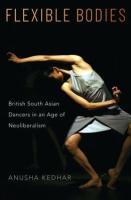Description
Flexible Bodies honors the lives and labor of British South Asian dancers and celebrates their contributions to a distinct and dynamic sector of British dance. Drawing on expertise gained from over seven years dancing in Britain, author Anusha Kedhar presents a multifaceted picture of British South Asian dance as its own distinctive genre.�Analyzing dance works, dance films, rehearsals, and touring - alongside immigration policy, arts funding initiatives, and global economic conditions - Flexible Bodies traces shifts in British South Asian dance from 1990s "Cool Britannia" multiculturalism to fallout from the 2008 global financial crisis and, more recently, the anti-immigration rhetoric leading up to the Brexit referendum in 2016. Kedhar draws on over a decade of interviews and conversations with dancers in Britain as well as in-depth choreographic analysis of major dance works to reveal the creative ways in which British South Asian dancers negotiate neoliberal, multicultural dance markets through an array of flexible bodily practices. Providing a new, critical dance studies lens through which to view the precarious economic, racial, national, and legal positions of South Asians in Britain, Flexible Bodies�ultimately argues for centering dance labor in studies of neoliberalism.
Last updated on
Product Details
- Oxford University Press, Brand
- Oct 19, 2020 Pub Date:
- 9780190840143 ISBN-13:
- 0190840145 ISBN-10:
- 272 Pages
- English Language
- 9.1 in * 6.1 in * 0.8 in Dimensions:
- 1 lb Weight:




